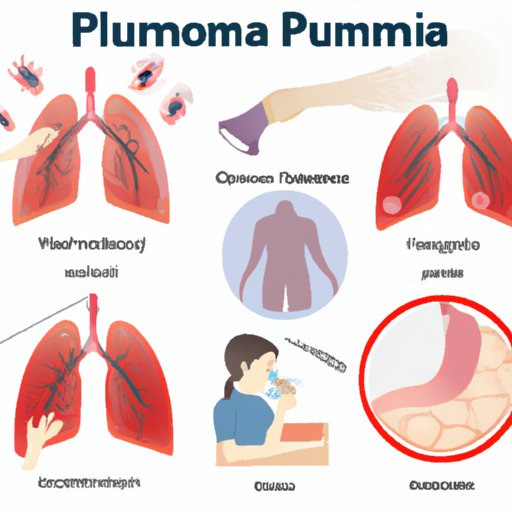
I. Introduction
Pneumonia is a serious respiratory infection that can range from mild to life-threatening. It affects millions of people worldwide every year, making it a significant public health concern. This article aims to provide readers with a comprehensive understanding of the common symptoms, types, risk factors, diagnosis, treatment, prevention, and potential complications of pneumonia.
II. Common Symptoms of Pneumonia
The most common symptoms of pneumonia include coughing, fever, chest pain, rapid breathing, shortness of breath, and fatigue. It is essential to recognize these symptoms quickly because prompt treatment can help prevent further complications. Symptoms of pneumonia can range from mild to severe and can be similar to those of the common cold or flu.
III. Different Types of Pneumonia
Pneumonia can be caused by bacteria, viruses, fungi, or aspiration. Bacterial pneumonia is the most common type of pneumonia, followed by viral pneumonia. Fungal pneumonia is less common but can be severe in people with weakened immune systems. Aspiration pneumonia happens when food, drink, or saliva is inhaled into the lungs. Understanding the type of pneumonia is essential for treatment and recovery.
IV. Who is at Risk for Pneumonia?
Although anyone can develop pneumonia, some groups are more vulnerable, including older adults, young children, people with weakened immune systems, and those with chronic medical conditions such as asthma, diabetes, or heart disease. Environmental factors, such as smoking and air pollution, can also increase the risk of developing pneumonia. Taking steps to reduce your risk is crucial, especially if you fall into one of these at-risk groups.
V. The Role of X-Rays
X-rays play a vital role in diagnosing pneumonia by revealing the presence of inflammation or fluid in the lungs. During an X-ray, you will stand in front of a machine while a technician takes images of your chest. There are minimal risks associated with X-rays, such as exposure to radiation, but the benefits of an accurate diagnosis outweigh the risks.
VI. Treatment Options for Pneumonia
Antibiotics are the most common treatment for bacterial pneumonia, but viral pneumonia requires a different approach. Treatment options for viral pneumonia include antiviral medication, rest, and hydration. Cough medicine and oxygen therapy can be helpful in managing symptoms. Treatment will depend on the type and severity of pneumonia and the individual’s overall health status.
VII. Preventing Pneumonia
There are several effective ways to prevent pneumonia, such as getting vaccinated, practicing good hygiene, and avoiding smoking and air pollution. Vaccines can help prevent common bacterial and viral causes of pneumonia, and practicing good hygiene, like washing your hands frequently, can limit your exposure to harmful bacteria and viruses. Taking steps to prevent pneumonia can help keep you and those around you safe and healthy.
VIII. Complications of Pneumonia
Complications of pneumonia can be severe, including lung abscess, pleural effusion, and sepsis. Complications can occur in anyone with pneumonia but are more likely to occur in people with weakened immune systems or underlying medical conditions. Seeking medical attention as soon as possible can help prevent further complications and ensure appropriate treatment.
IX. Conclusion
In conclusion, pneumonia is a serious respiratory infection that can affect anyone. Recognizing symptoms quickly, seeking appropriate medical attention, and taking steps to prevent pneumonia are crucial in maintaining good health. This article aimed to provide readers with a comprehensive understanding of pneumonia, including common symptoms, types, risk factors, diagnosis, treatment, prevention, and complications. If you suspect that you or a loved one may have pneumonia, seek medical attention immediately.





